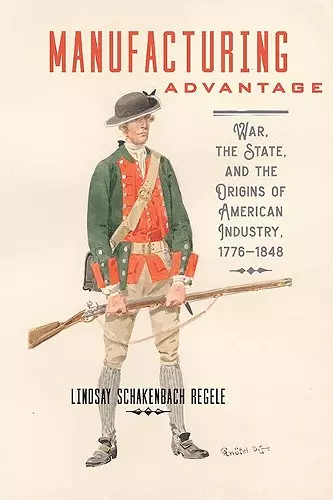Manufacturing Advantage
War, the State, and the Origins of American Industry, 1776–1848
Lindsay Schakenbach Regele author
Format:Hardback
Publisher:Johns Hopkins University Press
Published:15th Feb '19
Currently unavailable, and unfortunately no date known when it will be back

How manufacturing textiles and guns transformed the United States from colonial dependent to military power.
In 1783, the Revolutionary War drew to a close, but America was still threatened by enemies at home and abroad. The emerging nation faced tax rebellions, Indian warfare, and hostilities with France and England. Its arsenal—a collection of hand-me-down and beat-up firearms—was woefully inadequate, and its manufacturing sector was weak. In an era when armies literally froze in the field, military preparedness depended on blankets and jackets, the importation of which the British Empire had coordinated for over 200 years. Without a ready supply of guns, the new nation could not defend itself; without its own textiles, it was at the economic mercy of the British. Domestic industry offered the best solution for true economic and military independence.
In Manufacturing Advantage, Lindsay Schakenbach Regele shows how the US government promoted the industrial development of textiles and weapons to defend the country from hostile armies—and hostile imports. Moving from the late 1700s through the Mexican-American War, Schakenbach Regele argues that both industries developed as a result of what she calls “national security capitalism”: a mixed enterprise system in which government agents and private producers brokered solutions to the problems of war and international economic disparities. War and State Department officials played particularly key roles in the emergence of American industry, facilitating arms makers and power loom weavers in the quest to develop industrial resources. And this defensive strategy, Schakenbach Regele reveals, eventually evolved to promote westward expansion, as well as America’s growing commercial and territorial empire.
Examining these issues through the lens of geopolitics, Manufacturing Advantage places the rise of industry in the United States in the context of territorial expansion, diplomacy, and warfare. Ultimately, the book reveals the complex link between government intervention and private initiative in a country struggling to create a political economy that balanced military competence with commercial needs.
An original and fascinating book that rewards the reader with discerning insights into the genesis of American industry . . . The author writes with verve and a captivating command of nuance, insight, breadth and in-depth analysis . . . In sum, both historians and economists would benefit from closely engaging with the arguments in this fine addition to the bookshelf on the early sources of American industrial supremacy.
—B. Zorina Khan, Bowdoin College, EH.Net
Manufacturing Advantage is an important addition to the field of policy history and an equally important contribution to scholarship in several other historical disciplines, including business history, history of technology, and military history. Her analytical framework of "national security capitalism" offers an important new perspective for scholars in the above fields.
—Vagel C. Keller, Pennsylvania History
ISBN: 9781421425252
Dimensions: 229mm x 152mm x 21mm
Weight: 499g
280 pages